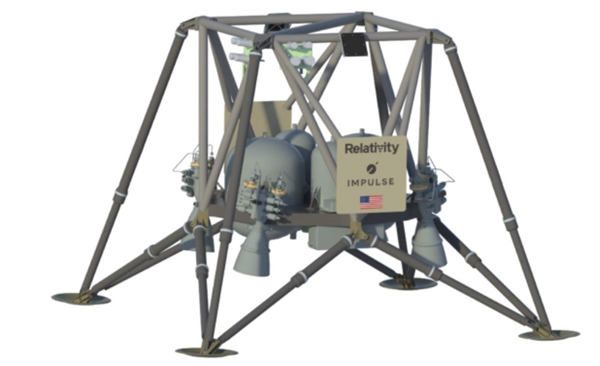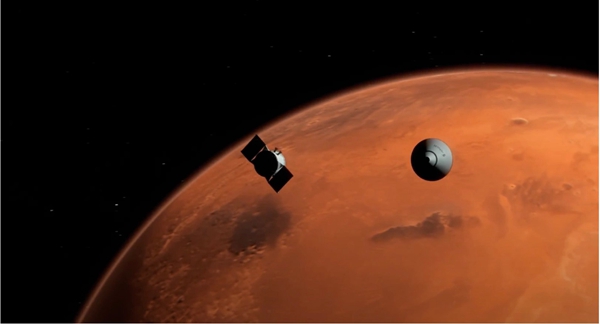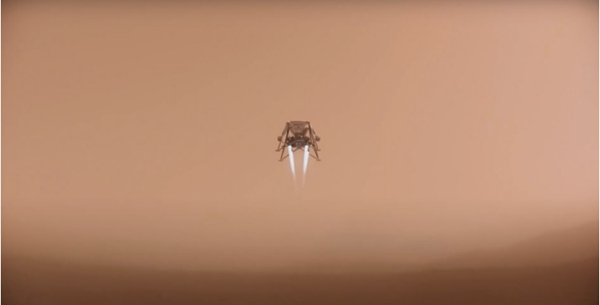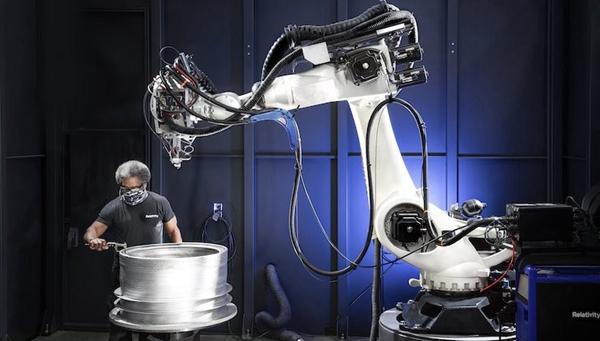20 July 2022 - Relativity Space, a 3D printing rocket startup planning its first orbital test launch this year, says it is planning to send an Impulse Space-built Mars lander and rover to Mars as early as 2024. By making the announcement, the two companies aim to significantly advance the timeline for launching entirely private rockets to Mars.
Impulse, a new startup founded by SpaceX veteran and founding employee Tom Mueller, will provide the Mars rover, entry module and lander, while Relativity will use its reusable Terran R, a medium- to heavy-lift launch vehicle, to deliver the payload. Its sister rocket, Terran 1, will probably make its first orbital launch this year. Although it has yet to launch a rocket, the company told TechCrunch in June that it has a firm launch contract for Terran R of more than $1.2 billion.

△ Preliminary design of the Mars lander built by Impulse Space
Mueller announced his resignation in November 2020 from SpaceX, where he led the development of multiple rocket engines, including the Merlin engine that still powers the Falcon 9 and Falcon Heavy rockets. He founded Impulse in September 2021. The company announced in March this year that it had closed a $20 million seed funding round led by Peter Thiel's Founders Fund.
The company said it would seek to provide "economical last-mile space payload delivery services" such as in-orbit services, space station orbit-keeping or space transportation. This is the first time Impulse has announced plans to travel to Mars.

The exclusive agreement between the two companies runs until 2029. As Impulse details on its website, after Terran R has launched the payload into the correct Mars orbit, the rover will inject the entry module into the Martian atmosphere. From there, the lander will land on the surface of Mars using the internal Impulse engine.
Tim Ellis, founder of Relativity, has been clear about his long-term vision for going to Mars. "Our long-term mission remains that we want to help build an industrial base on Mars and help make humanity multi-planetary," he told TechCrunch in June. even so, while the news isn't entirely surprising, the planned launch schedule is still very ambitious.
Ellis is also not holding back on the role SpaceX plays in his own Mars ambitions.
"When we started Relativity, the inspiration came from watching SpaceX's rockets land and dock with the space station." They were only 13 years old at the time, and despite those pretty inspiring successes, they were the only company that wanted to make humans multi-planetary and go to Mars," he said in an interview with TechCrunch in June 2021. No one else actually even tried to go to Mars or said it was their core mission, and it still is today, in fact, even five years later, it's still just us and SpaceX."

About Relativity and Impulse Space
Founded in 2015, Relativity has raised over $1 billion and plans to launch its small Terran later this year.1 The company, which seeks to 3D print most of its vehicles, is already developing a fully reusable Terran R. The booster is designed to be more powerful than SpaceX's Falcon 9 and will carry out commercial missions to Mars. Relativity plans to have the Terran R rocket ready for launch in 2024, with the Mars payload on its first mission in late 2024.

Impulse Space is relatively new, less than a year old, but not without experienced engineers. The company was founded by Tom Mueller, the first boss to hire an employee and department head from SpaceX in more than a decade. Their company's engines power the Falcon 9, Falcon Heavy and Dragon vehicles. Mueller believes the launch "problem is solved" and is developing a range of non-toxic, low-cost thrusters to serve the space propulsion market.







